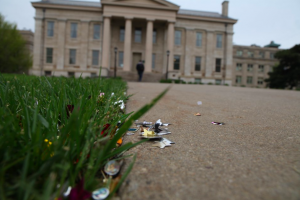Looming liver donation policy causes UIHC to take a stand
The University of Iowa has joined a lawsuit that will change how liver donations are distributed to patients in need of a transplant.
University of Iowa Hospitals and Clinics as seen on Sept 17, 2018.
May 7, 2019
A new policy from the U.S. Department of Health & Human Services and the United Network for Organ Sharing would ship liver organ donations from Iowa to locations where officials have determined they are needed most, but the University of Iowa Hospitals & Clinics has joined a lawsuit that claims the policy puts lives at risk.
Currently, donated organs in Iowa are typically received by patients in the area. However, if the new policy goes into effect on May 14, how livers are given to patients in need will be redefined.
“The new [policy] would give priority to patients who are within 150 miles of the donor hospital,” said Suzanne Conrad, the CEO of the Iowa Donor Network. “If there is no one who is more sick, then 250 [miles], then 500.”
For the UI, issues arise when those new radius boundaries are expanded to patients out of state.
“For instance, in Davenport, the sickest person within 150 miles of a donor hospital in Davenport would probably be in Iowa City,” Conrad said. “But if you move out to the next concentric circle at 250, the sickest person would probably be listed at a transplant center in Chicago. Omaha would come up before Des Moines would.”
According to a statement from CEO Brian Shepard on the United Network for Organ Sharing website, “The new policy improves upon the previous system to make it fairer by providing more equitable access to a transplant for the benefit of all patients based on medical need.”
Shepard said the prior system developed geographic disparities for patients in need. However, Alan Reed, the director of the UI Hospitals & Clinics organ-transplant center, believes the system change will only increase disparity for Iowans.
Iowa ranked ninth in the nation for the number of designated organ donors in 2017, according to statista.com. Other states, such as New York, Mississippi, and New Jersey, have larger populations but a lower percentage of registered donors, creating a high dependency on organs from other states.
RELATED: Event honors organ donors, recipients
While Reed said the new policy sounds good on the surface for efficiently allocating livers, there isn’t enough supply to meet demands under either policy.
“We have a demand that exceeds supply everywhere. There are always more people waiting than we have organs available,” Reed said. “What is the best way to allocate organs in a system when you are [already] supply-constrained? These are just symptoms of a bigger problem.”
The new boundaries that the policy will implement also puts Iowans at a disadvantage based on population, in Reed’s view.
“There’s always going to be somebody sicker in a bigger city than there is out here in a rural area,” he said. “Transplanting the sickest person first doesn’t always make the most sense from an outcomes or value point of view.”
Patients in the area are concerned, as well, Reed noted.
“We’ve gotten a lot of calls from patients in Iowa who are very worried about what this might mean,” he said. “I’m very concerned that if this new policy goes through, then patients in rural states like ours will really suffer.”






